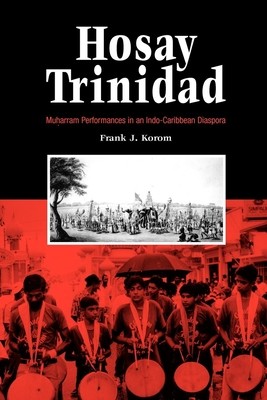
- We will send in 10–14 business days.
- Author: Frank J Korom
- Publisher: University of Pennsylvania Press
- ISBN-10: 0812218256
- ISBN-13: 9780812218251
- Format: 15.2 x 22.6 x 2.3 cm, softcover
- Language: English
- SAVE -10% with code: EXTRA
Reviews
Description
The multivocalic rite known as Hosay in the Caribbean developed out of earlier practices originating in Iraq and Iran which diffused to Trinidad by way of South Asian indentured laborers brought to the Caribbean by the British from the mid-1800s to the early decades of the twentieth century. The rituals are important as a Shi'i religious observance, but they also are emblems of ethnic and national identity for Indo-Trinidadians. Frank Korom investigates the essential role of Hosay in the performance of multiple identities by historically and ethnographically situating the event in Middle Eastern, South Asian, and Caribbean contexts. Hosay Trinidad: Muharram Performances in an Indo-Caribbean Diaspora is the first detailed historical and ethnographic study of Islamic muharram rituals performed on the island of Trinidad.
Korom's central argument is that the annual rite is a polyphonic discourse that is best understood by employing multiple levels of interpretation. On the symbolic level the observance provides esoteric meaning to a small community of Indo-Trinidadian Muslims. On another level, it is perceived to be representative of transplanted Indian culture as a whole. Finally, the rituals are becoming emblematic of Trinidad's polyethnic population. Addressing strategies used to resist integration and assimilation, Hosay Trinidad is engaged with theories concerning the notion of cultural creolization in the Caribbean as well as in the general study of global diasporas.EXTRA 10 % discount with code: EXTRA
The promotion ends in 18d.23:22:40
The discount code is valid when purchasing from 10 €. Discounts do not stack.
- Author: Frank J Korom
- Publisher: University of Pennsylvania Press
- ISBN-10: 0812218256
- ISBN-13: 9780812218251
- Format: 15.2 x 22.6 x 2.3 cm, softcover
- Language: English English
The multivocalic rite known as Hosay in the Caribbean developed out of earlier practices originating in Iraq and Iran which diffused to Trinidad by way of South Asian indentured laborers brought to the Caribbean by the British from the mid-1800s to the early decades of the twentieth century. The rituals are important as a Shi'i religious observance, but they also are emblems of ethnic and national identity for Indo-Trinidadians. Frank Korom investigates the essential role of Hosay in the performance of multiple identities by historically and ethnographically situating the event in Middle Eastern, South Asian, and Caribbean contexts. Hosay Trinidad: Muharram Performances in an Indo-Caribbean Diaspora is the first detailed historical and ethnographic study of Islamic muharram rituals performed on the island of Trinidad.
Korom's central argument is that the annual rite is a polyphonic discourse that is best understood by employing multiple levels of interpretation. On the symbolic level the observance provides esoteric meaning to a small community of Indo-Trinidadian Muslims. On another level, it is perceived to be representative of transplanted Indian culture as a whole. Finally, the rituals are becoming emblematic of Trinidad's polyethnic population. Addressing strategies used to resist integration and assimilation, Hosay Trinidad is engaged with theories concerning the notion of cultural creolization in the Caribbean as well as in the general study of global diasporas.

Reviews